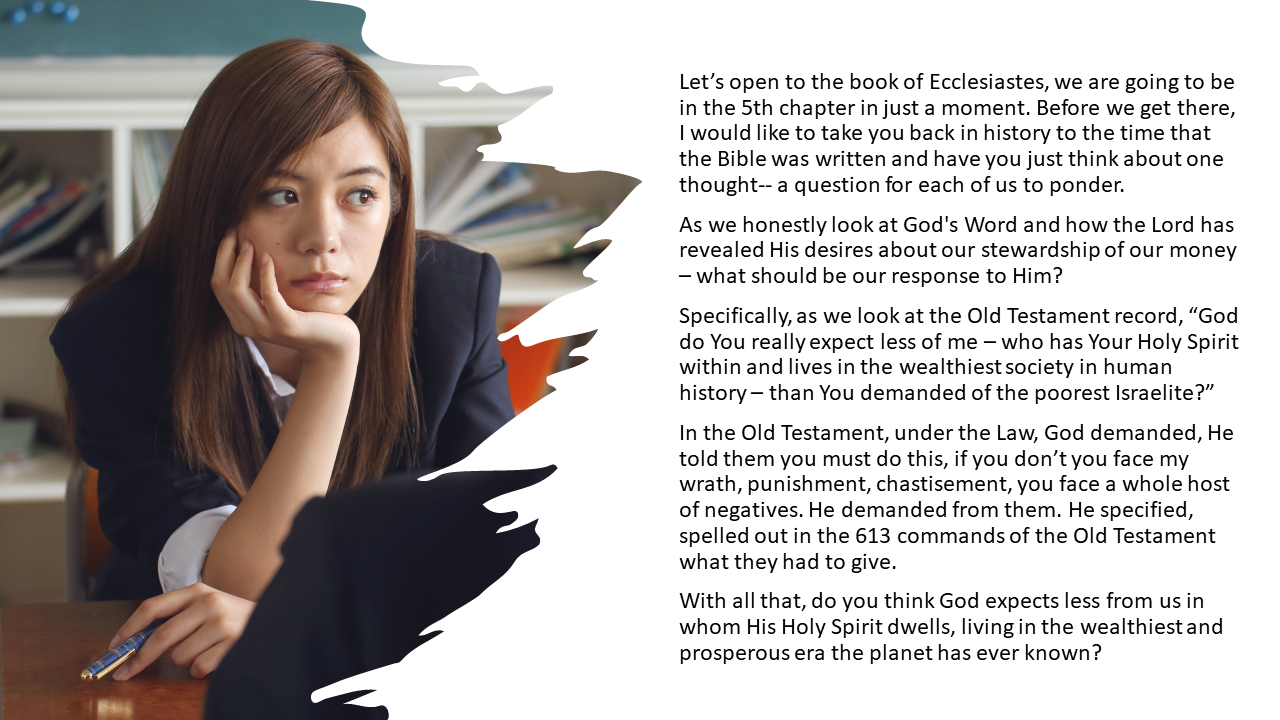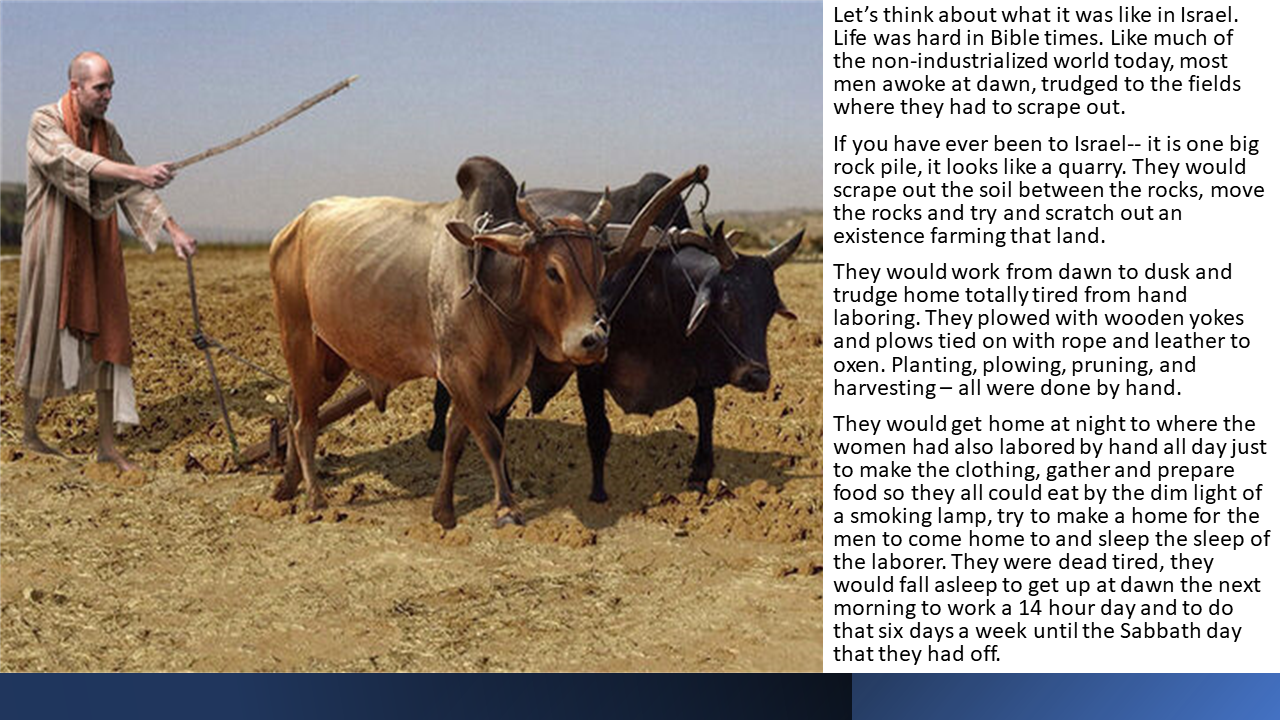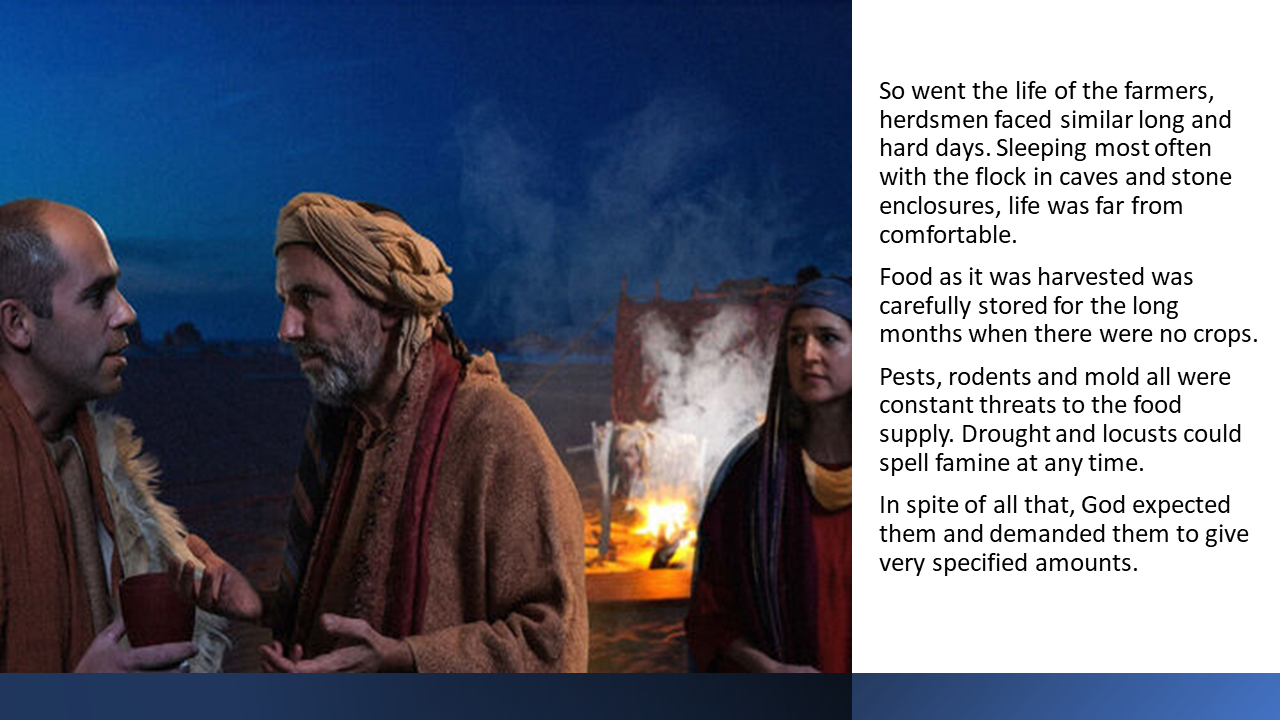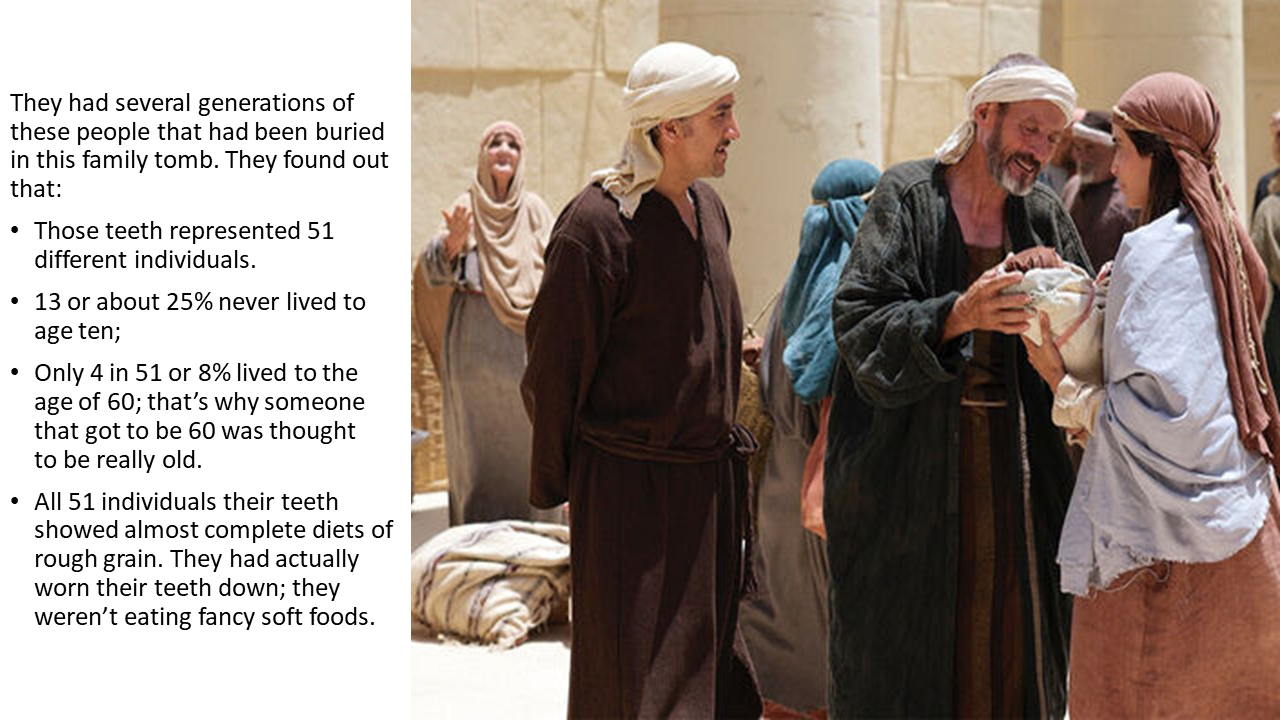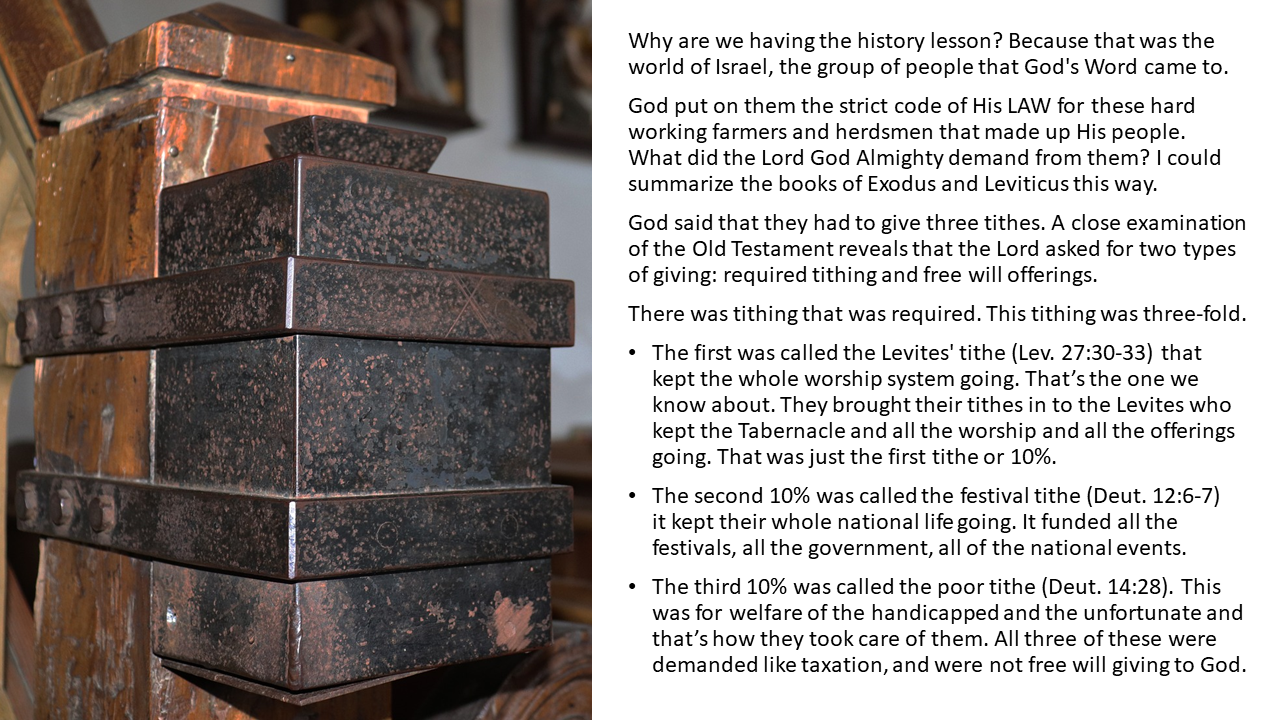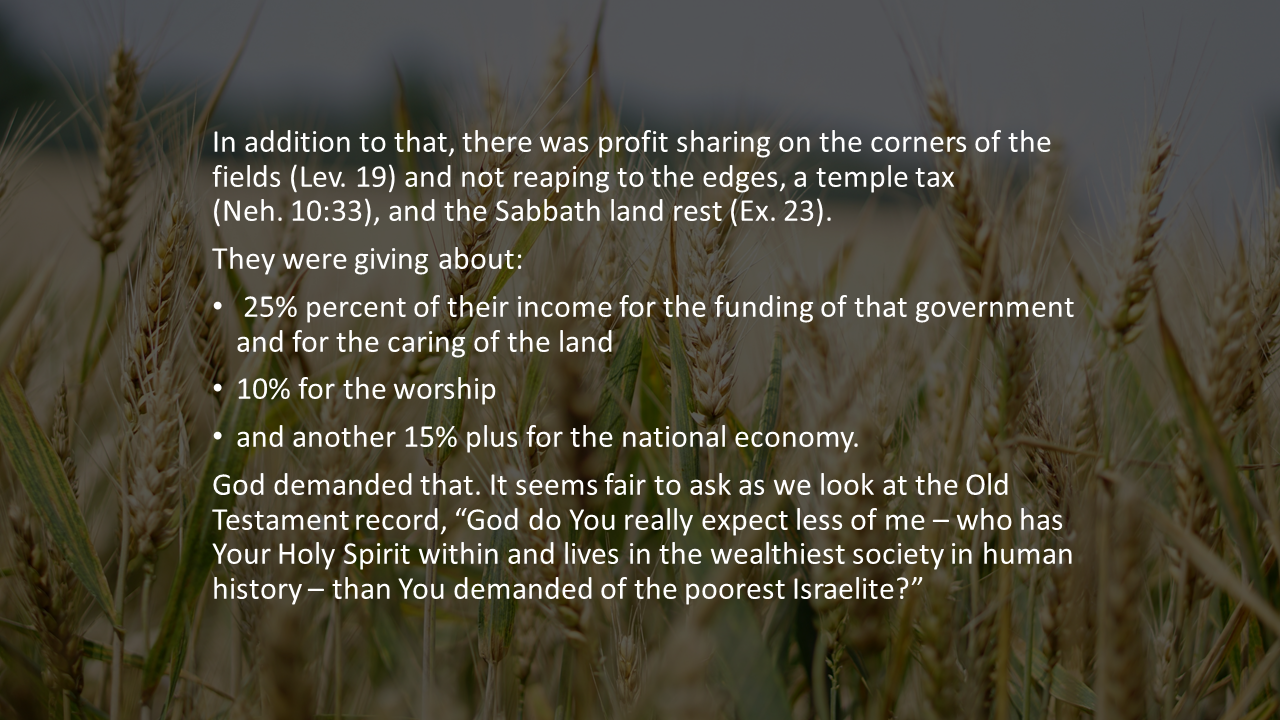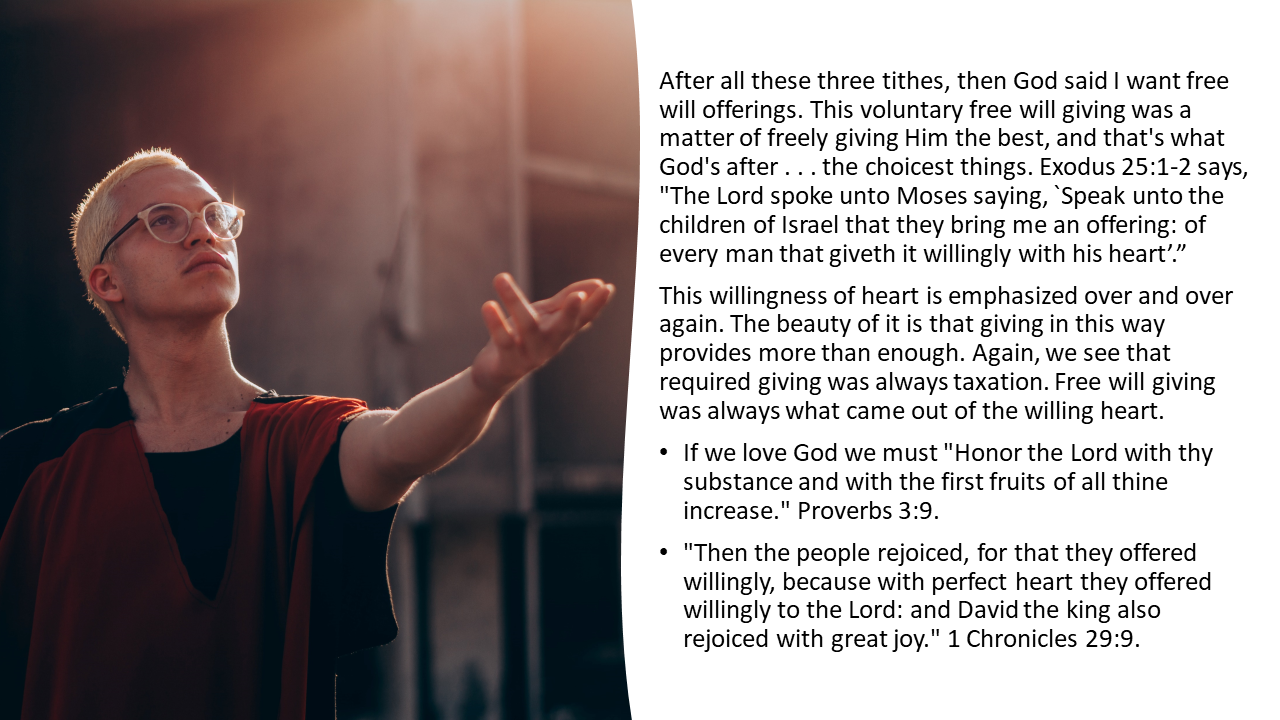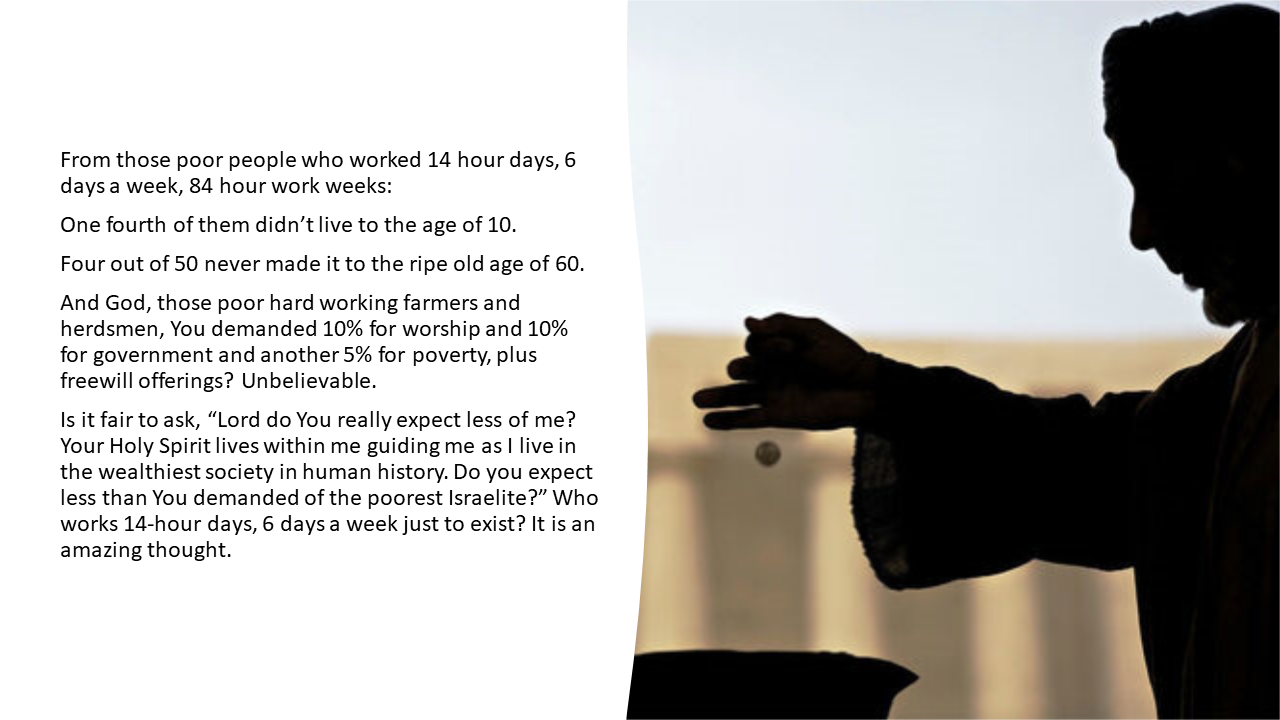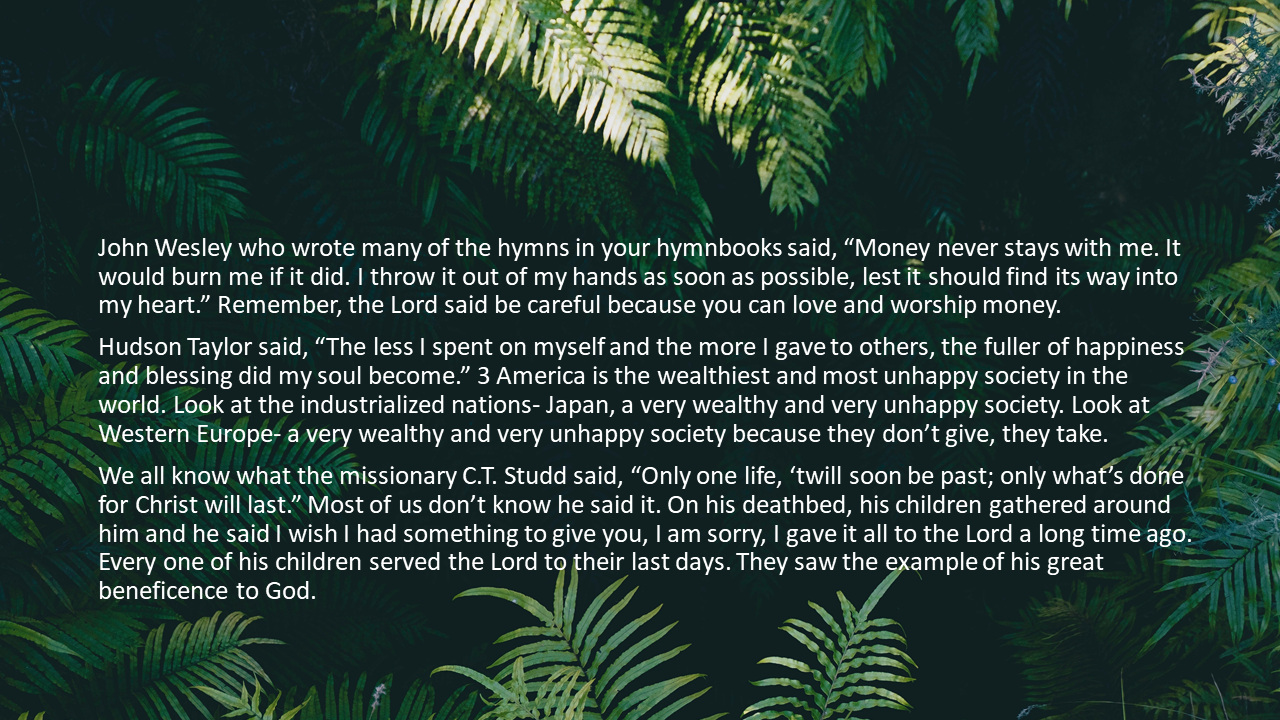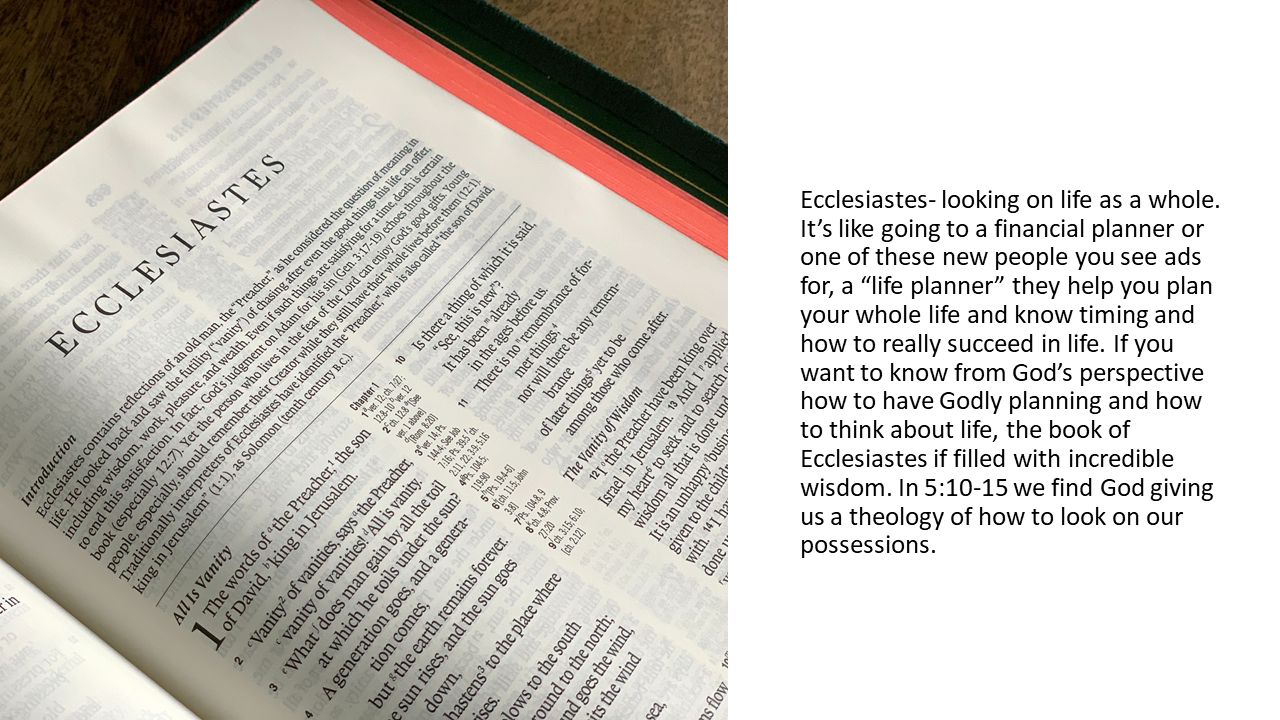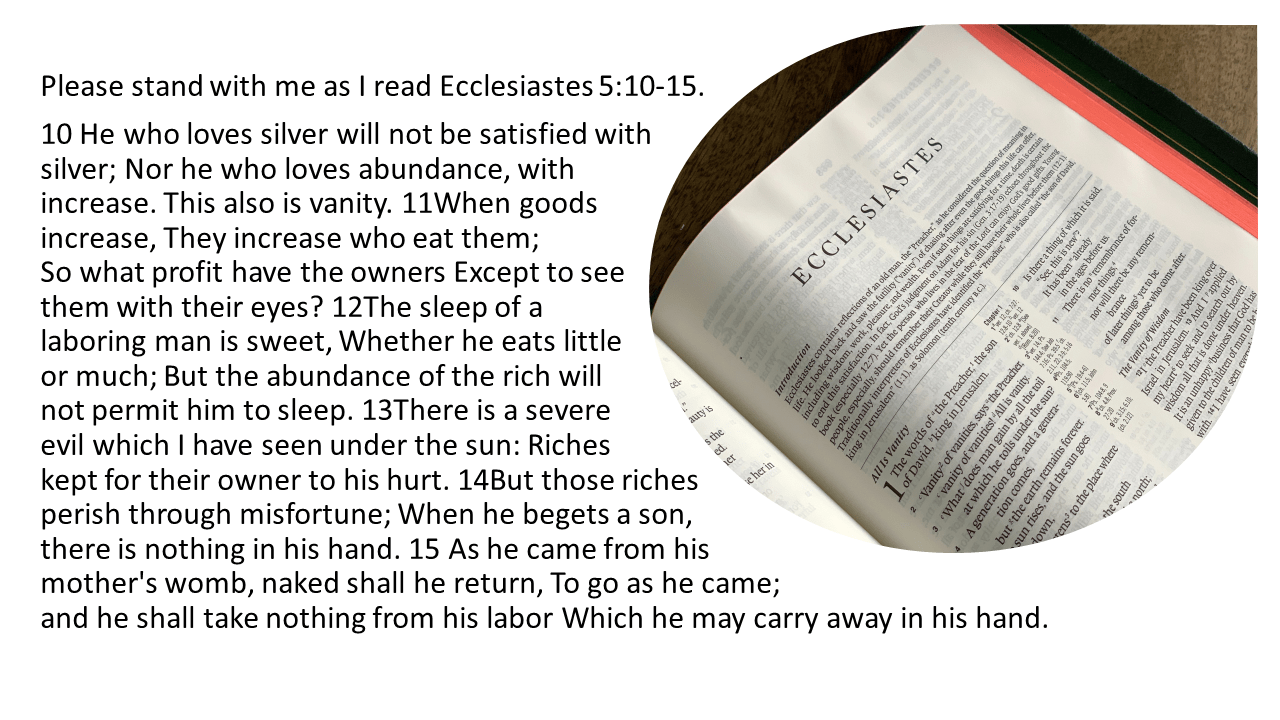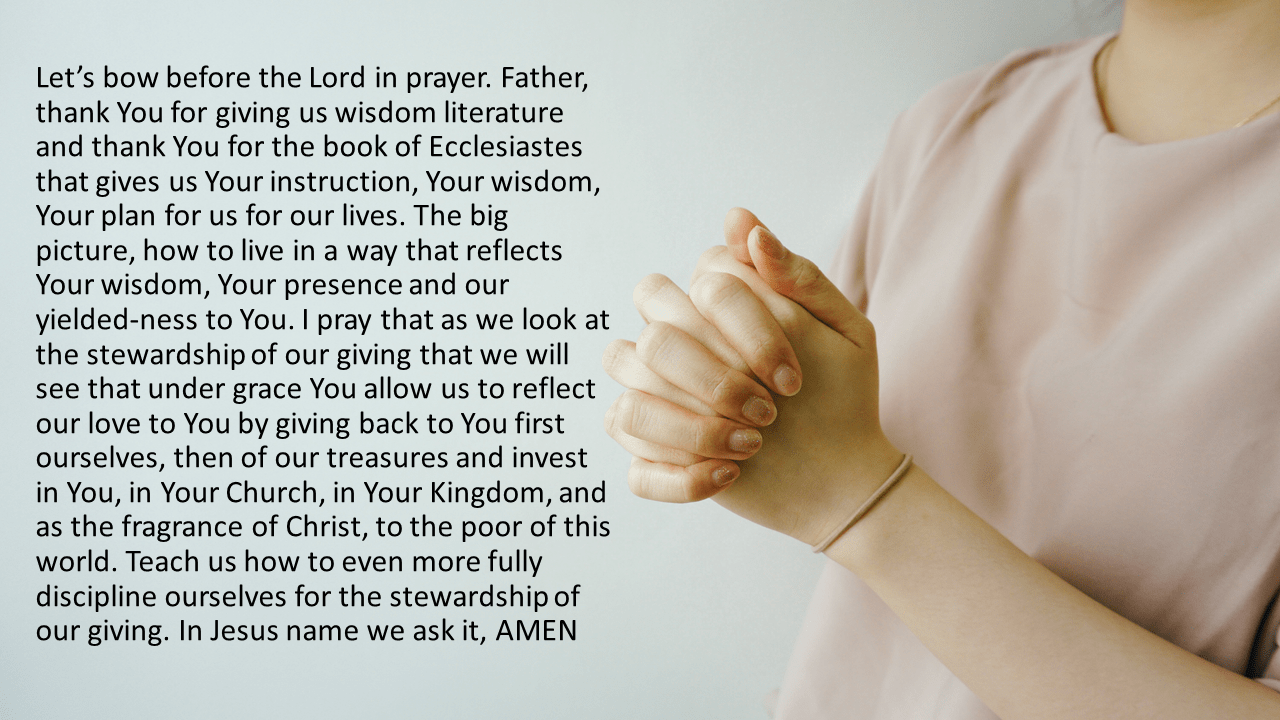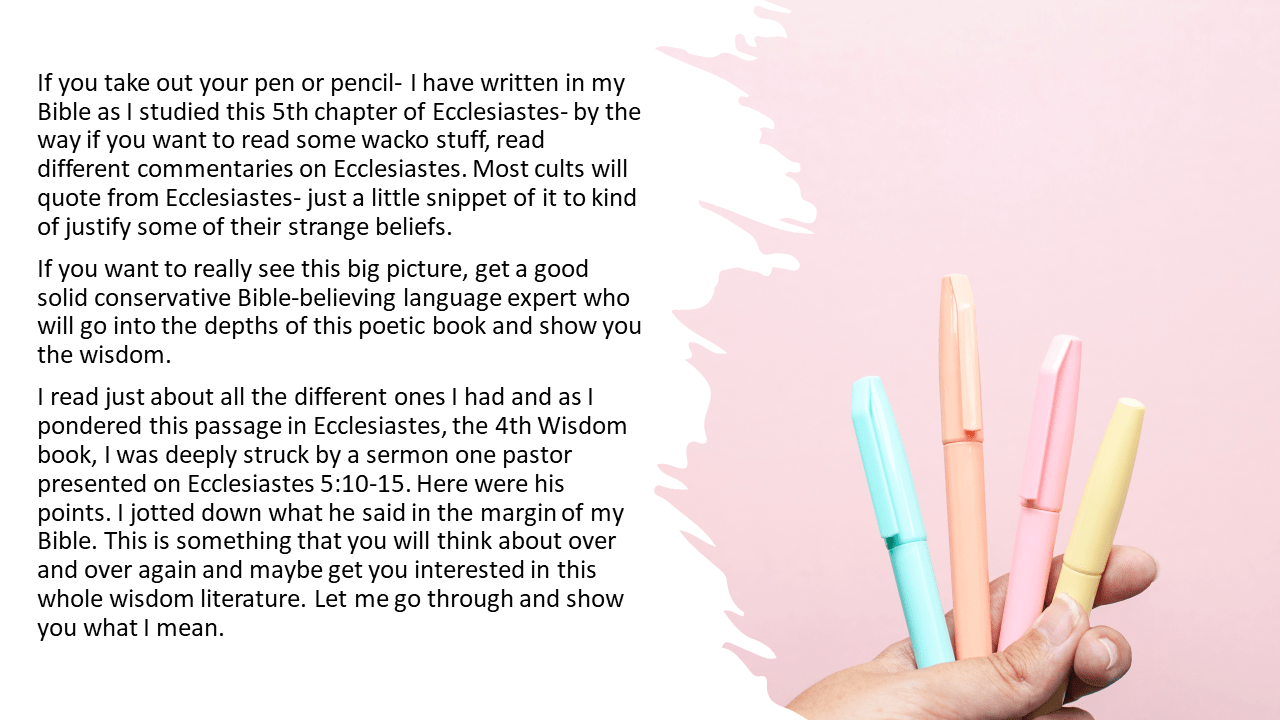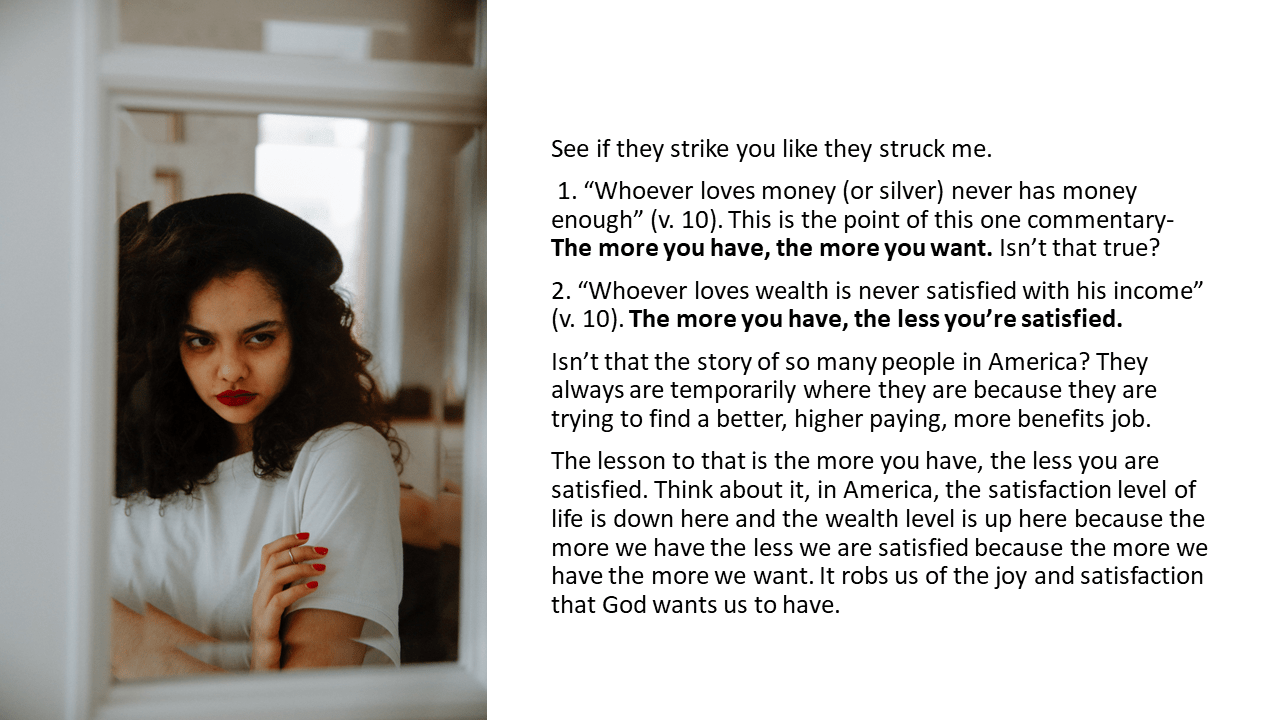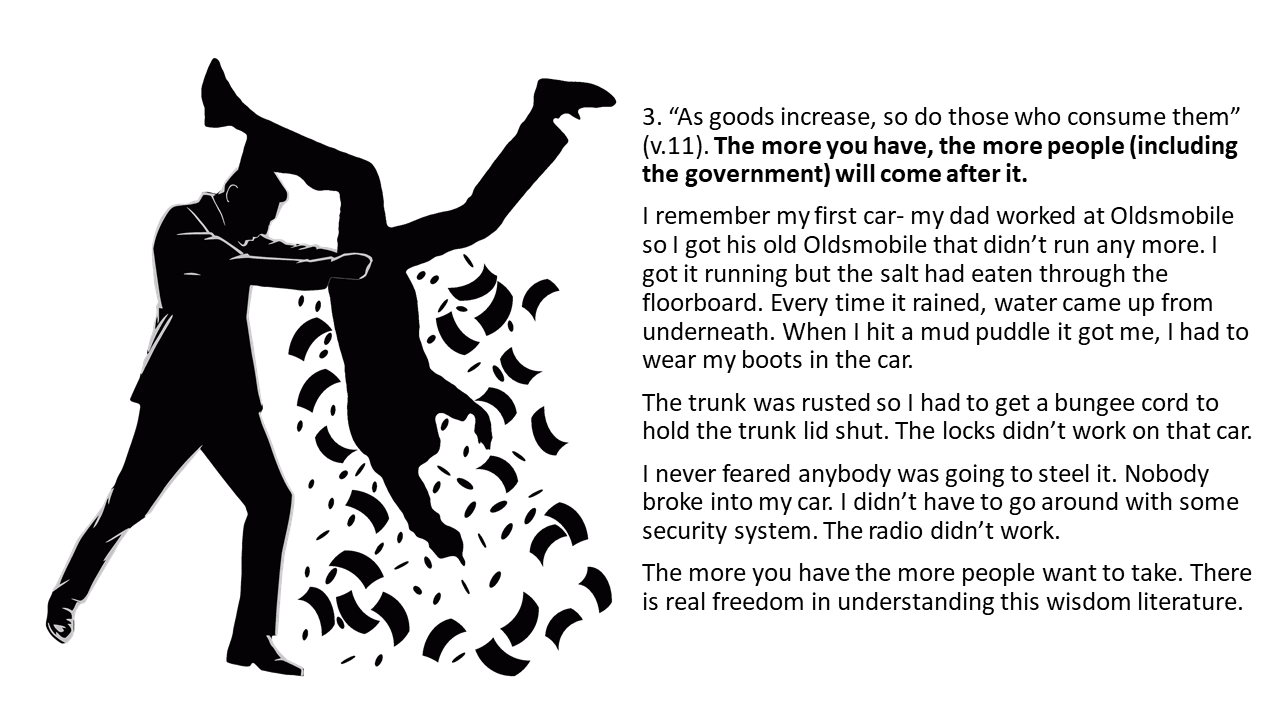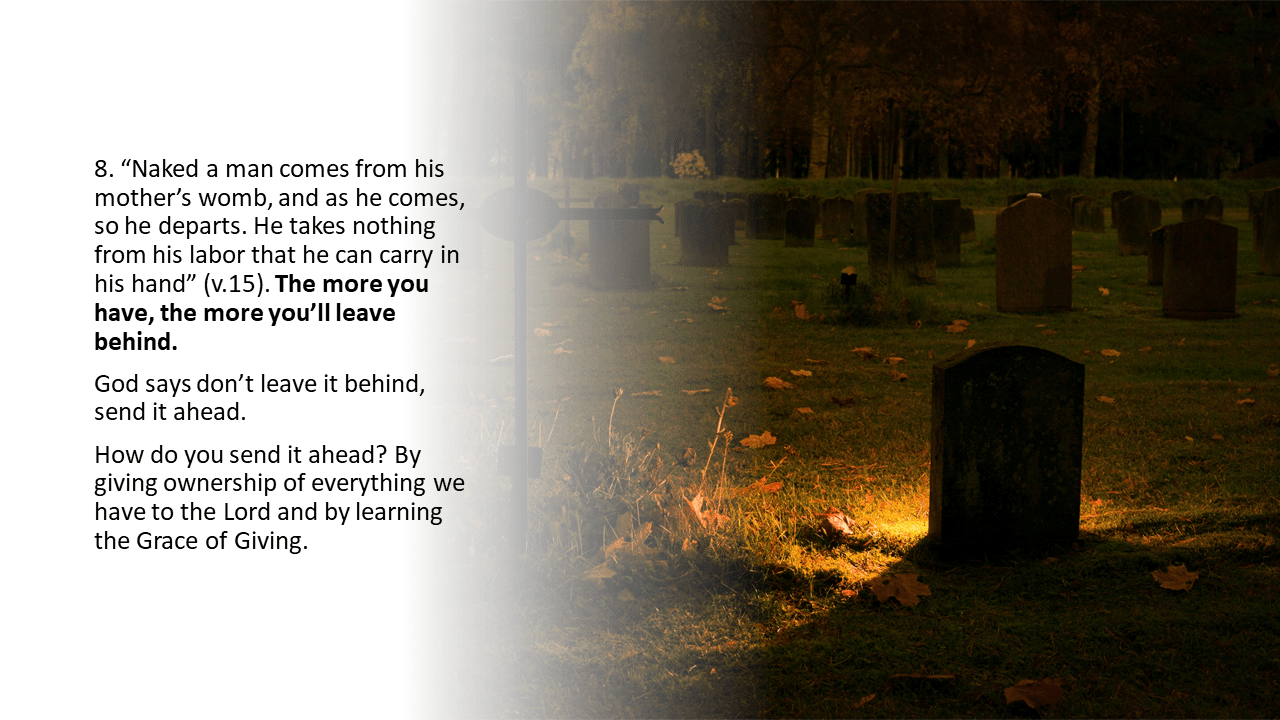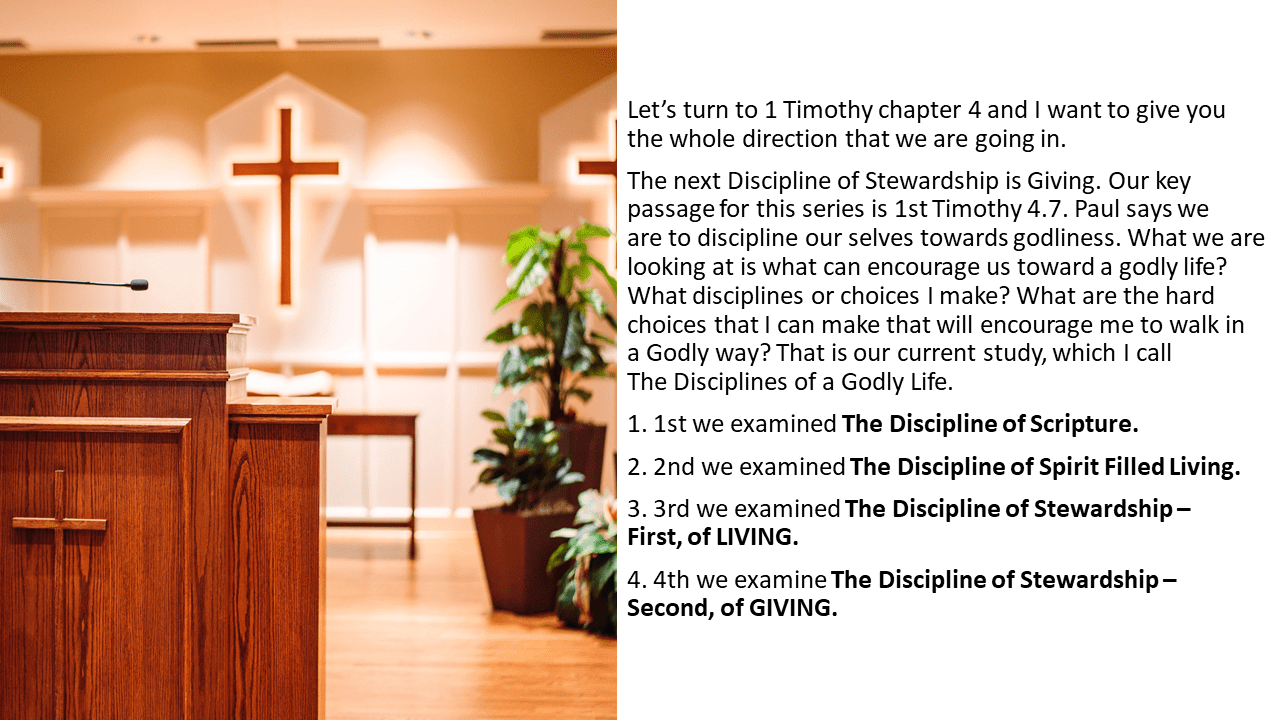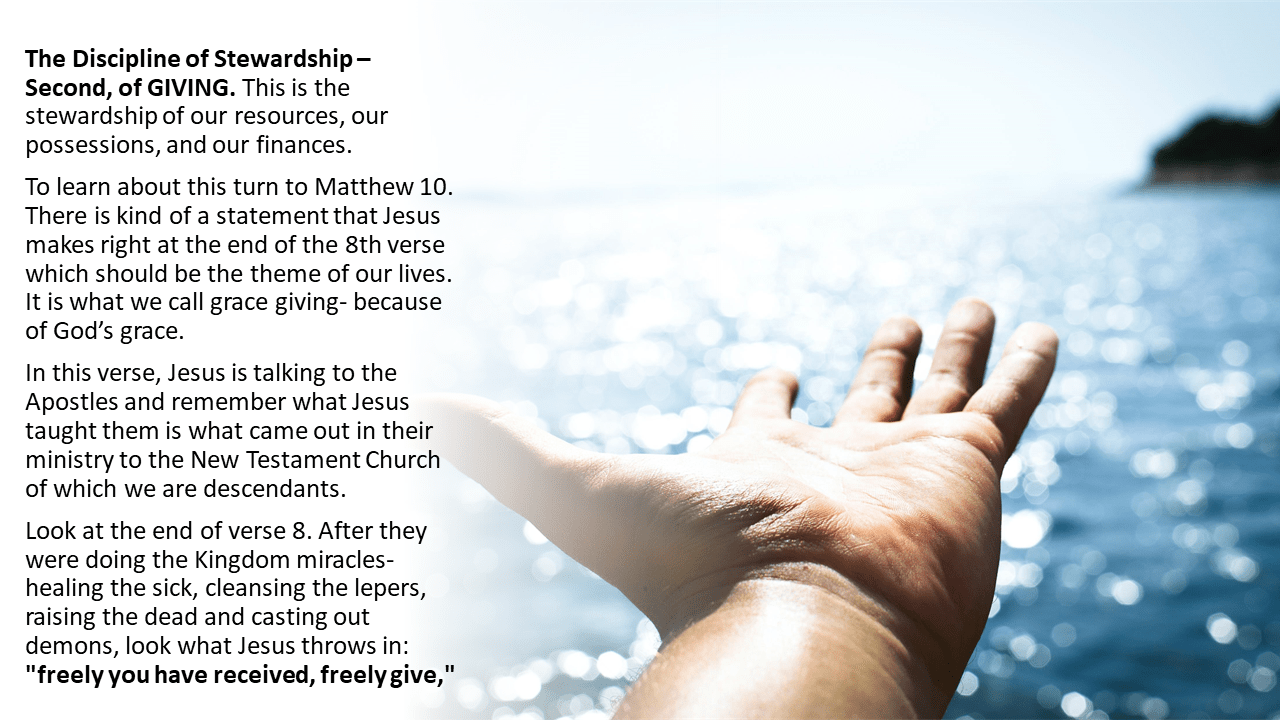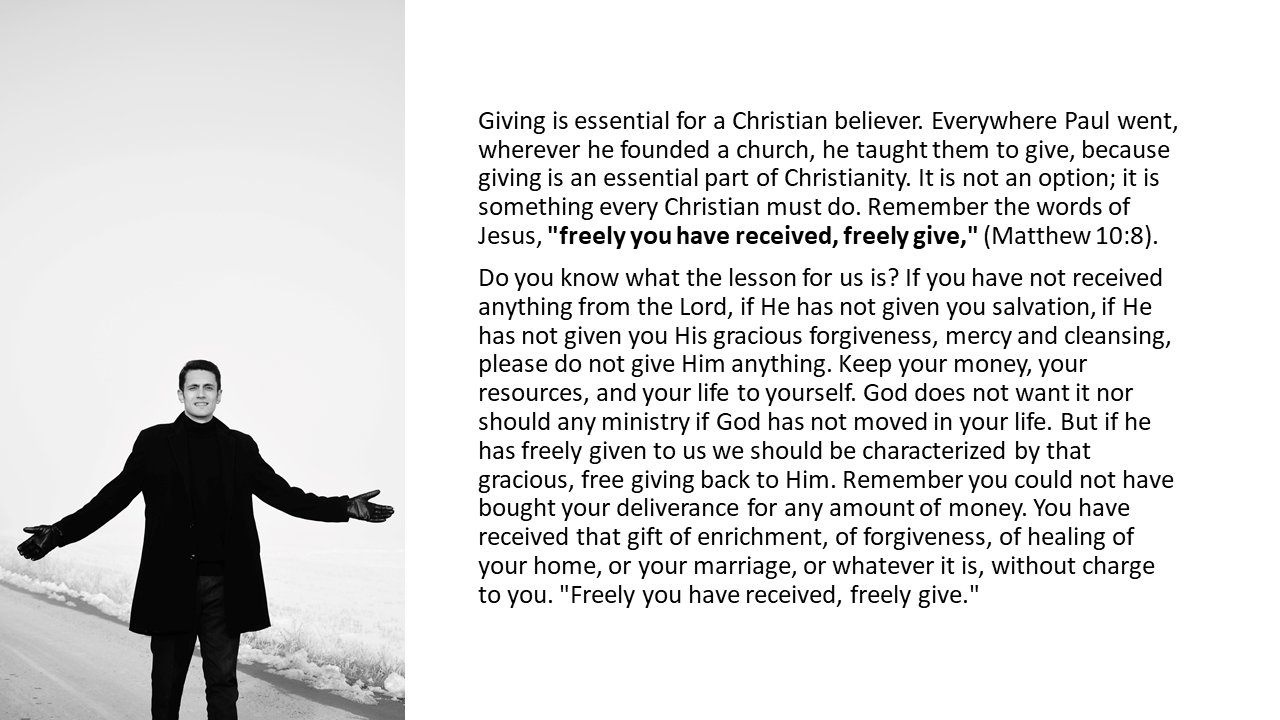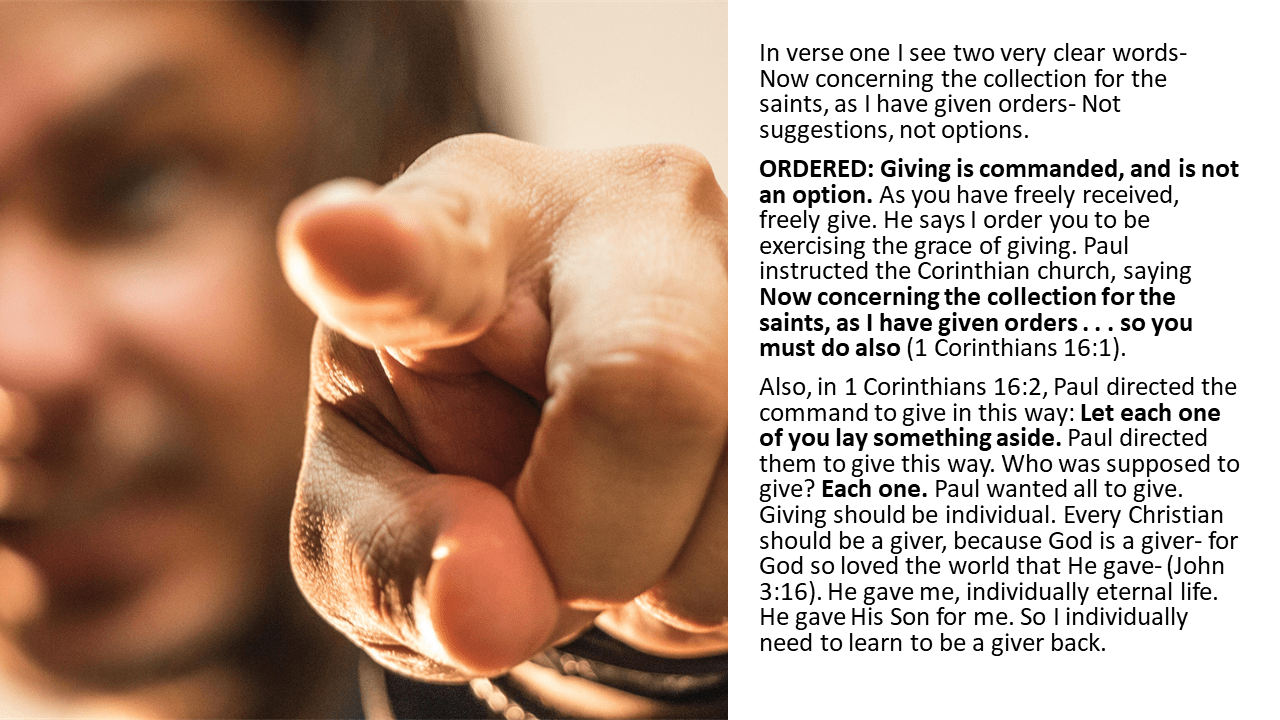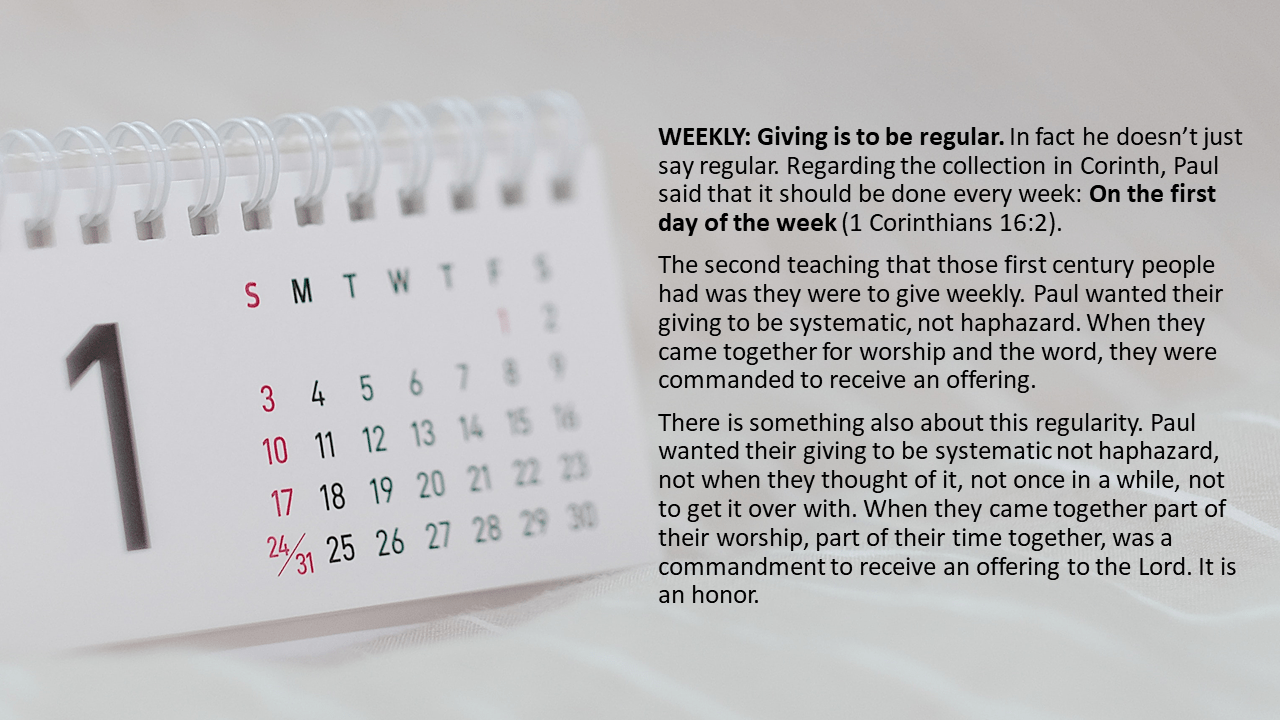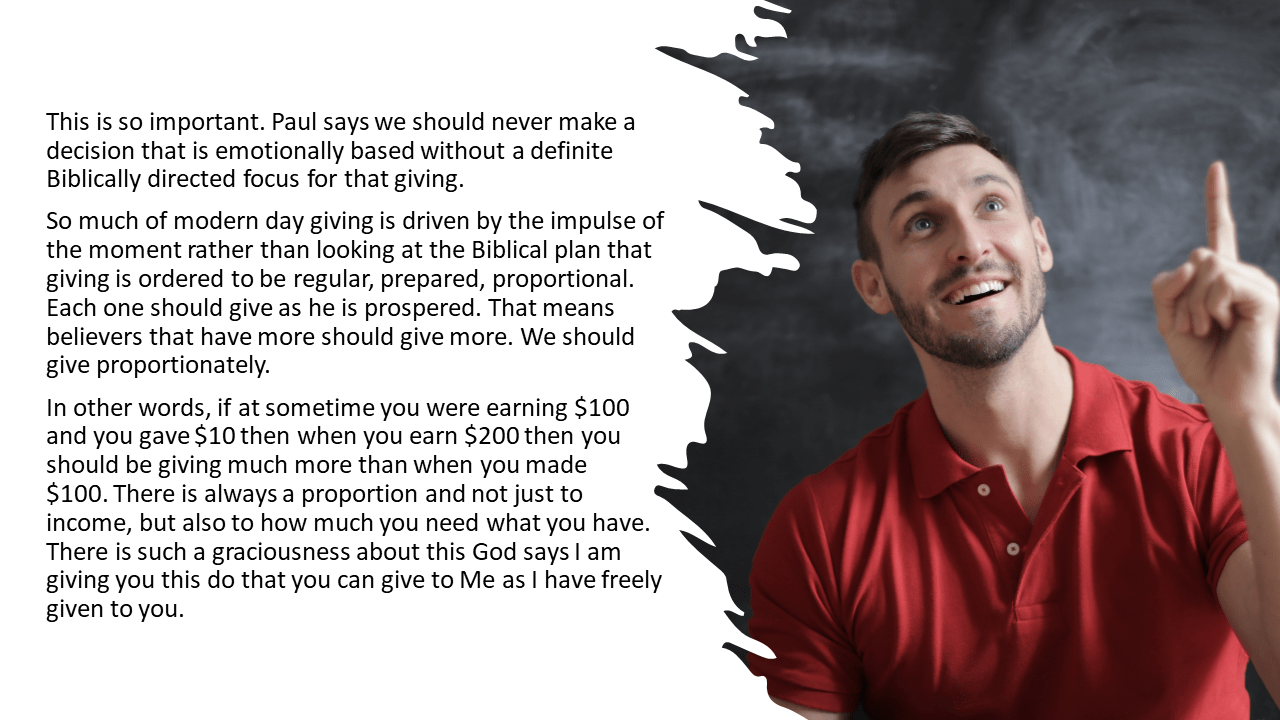If the YouTube video above is not available, here are two other ways to view:
DYG-10 & WFL-05
030202AM
Stewardship: Giving Freely to Jesus DYG: Message Ten
Let’s open to the book of Ecclesiastes, we are going to be in the 5th chapter in just a moment. Before we get there, I would like to take you back in history to the time that the Bible was written and have you just think about one thought– a question for each of us to ponder. As we honestly look at God’s Word and how the Lord has revealed His desires about our stewardship of our money – what should be our response to Him? Specifically, as we look at the Old Testament record, “God do You really expect less of me – who has Your Holy Spirit within and lives in the wealthiest society in human history – than You demanded of the poorest Israelite?” In the Old Testament, under the Law, God demanded, He told them you must do this, if you don’t you face my wrath, punishment, chastisement, you face a whole host of negatives. He demanded from them. He specified, spelled out in the 613 commands of the Old Testament what they had to give. With all that, do you think God expects less from us in whom His Holy Spirit dwells, living in the wealthiest and prosperous era the planet has ever known?
LIFE WAS HARD BACK THEN
Let’s think about what it was like in Israel. Life was hard in Bible times. Like much of the non-industrialized world today, most men awoke at dawn, trudged to the fields where they had to scrape out— if you have ever been to Israel– it is one big rock pile- it looks like a quarry— and they would scrape out the soil between the rocks, move the rocks and try and scratch out an existence farming that land. They would work from dawn to dusk and trudge home totally tired from hand laboring. They plowed with wooden yokes and plows tied on with rope and leather to oxen. Planting, plowing, pruning, and harvesting – all were done by hand. They would get home at night to where the women had also labored by hand all day just to make the clothing, gather and prepare food so they all could eat by the dim light of a smoking lamp, try to make a home for the men to come home to and sleep the sleep of the laborer. They were dead tired, they would fall asleep to get up at dawn the next morning to work a 14 hour day and to do that six days a week until the Sabbath day that they had off.
So went the life of the farmers, herdsmen faced similar long and hard days. Sleeping most often with the flock in caves and stone enclosures, life was far from comfortable. Food as it was harvested was carefully stored for the long months when there were no crops. Pests, rodents and mold all were constant threats to the food supply. Drought and locusts could spell famine at any time. In spite of all that, God expected them and demanded them to give very specified amounts.
It is interesting after the Israelite archaeologists began to have freedom to excavate all over modern day Israel—they began digging up the past. I was reading one archaeological report from the 1970’s where they found a family tomb. In Israel when people died they would wrap them up just like Lazarus and Jesus were, lay them on a shelf like they laid Jesus on a shelf only they would leave them there until they completely reduced to bones and then they would unwrap them and move the bones into a little crypt where all the family bones were kept. Generation after generation was buried in the same family tomb area and they would just keep moving them into this depository. The archaeologists have found those depositories. They have found literally scores of years of family life that is registered by all the bones. They scooped one entire depository up and brought it to America and presented the teeth they found to a dental school and asked what they could tell about the inhabitants of Biblical Israel. The longer archaeologists work in Israel, the more they find. Old Testament burial customs involved the use of extended family burial caves where the bones were stored for generations in the back of the caves in specials crypts. The end result being that an examination of these remains gives great insight into the life of ancient Israel. One cave found in the 1970’s contained among the bones – They found 762 human teeth. An American dental school examined these teeth and their findings are fascinating.
So they had several generations of these people that had been buried in this family tomb. They found out that: Those teeth represented 51 different individuals. o 13 or about 25% never lived to age ten; o Only 4 in 51 or 8% lived to the age of 60; that’s why someone that got to be 60 was thought to be really old. o All 51 individuals their teeth showed almost complete diets of rough grain. They had actually worn their teeth down; they weren’t eating fancy soft foods.
So why are we having the history lesson? Because that was the world of Israel, the group of people that God’s Word came to. God put on them the strict code of His LAW for these hard working farmers and herdsmen that made up His people. What did the Lord God Almighty demand from them? I could summarize the books of Exodus and Leviticus this way. God said that they had to give three tithes.
Old Testament GIVING
Well a close examination of the Old Testament reveals that the Lord asked for two types of giving: required tithing and free will offerings.
First, there was tithing that was required. This tithing was three-fold. The first was called the Levites’ tithe (Lev. 27:30-33) that kept the whole worship system going. That’s the one we know about. They brought their tithes in to the Levites who kept the Tabernacle and all the worship and all the offerings going. That was just the first tithe or 10%. The second 10% was called the festival tithe (Deut. 12:6-7) it kept their whole national life going. It funded all the festivals, all the government, all of the national events. The third 10% was called the poor tithe (Deut. 14:28). This was for welfare of the handicapped and the unfortunate and that’s how they took care of them. All three of these were demanded like taxation, and were not free will giving to God. In addition to that, there was profit sharing on the corners of the fields (Lev. 19) and not reaping to the edges, a temple tax (Neh. 10:33), and the Sabbath land rest (Ex. 23). They were giving about twenty-five percent of their income for the funding of that government and for the caring of the land—10% for the worship and another 15% plus for the national economy. God demanded that. It seems1 fair to ask as we look at the Old Testament record, “God do You really expect less of me – who has Your Holy Spirit within and lives in the wealthiest society in human history – than You demanded of the poorest Israelite?”
After all these three tithes, then God said I want free will offerings. This voluntary free will giving was a matter of freely giving Him the best, and that’s what God’s after . . . the choicest things. Exodus 25:1-2 says, “The Lord spoke unto Moses saying, `Speak unto the children of Israel that they bring me an offering: of every man that giveth it willingly with his heart’.” This willingness of heart is emphasized over and over again. The beauty of it is that giving in this way provides more than enough. So again we see that required giving was always taxation. Free will giving was always what came out of the willing heart.
o If we love God we must “Honor the Lord with thy substance and with the first fruits of all thine increase.” Proverbs 3:9.
o “Then the people rejoiced, for that they offered willingly, because with perfect heart they offered willingly to the Lord: and David the king also rejoiced with great joy.” 1 Chronicles 29:9.
I wonder- from those poor people who worked 14 hour days, 6 days a week, 84 hour work weeks- one fourth of them didn’t live to the age of 10. Four out of 50 never made it to the ripe old age of 60. And God, those poor hard working farmers and herdsmen, you demanded 10% for worship and 10% for government and another 5% for poverty plus freewill offerings? Unbelievable.
WOULD GOD EXPECT LESS
So is it2 fair to ask, “Lord do You really expect less of me? Your Holy Spirit lives within me guiding me as I live in the wealthiest society in human history. Do you expect less than You demanded of the poorest Israelite?” Who works 14-hour days, 6 days a week just to exist? Few people in our culture- It is an amazing thought. So, if we think about God’s demands on them, what does grace impel us to do?
- John Wesley who wrote many of the hymns in your hymnbooks said, “Money never stays with me. It would burn me if it did. I throw it out of my hands as soon as possible, lest it should find its way into my heart.” Remember, the Lord said be careful because you can love and worship money.
- Hudson Taylor said, “The less I spent on myself and the more I gave to others, the fuller of happiness and blessing did my soul become.” 3 America is the wealthiest and most unhappy society in the world. Look at the industrialized nations- Japan, a very wealthy and very unhappy society. Look at Western Europe- a very wealthy and very unhappy society because they don’t give, they take.
- We all know what the missionary C.T. Studd said, “Only one life, ‘twill soon be past; only what’s done for Christ will last.” Most of us don’t know he said it. On his deathbed, his children gathered around him and he said I wish I had something to give you, I am sorry, I gave it all to the Lord a long time ago. Every one of his children served the Lord to their last days. They saw the example of his great beneficence to God.
God has given some very timely warnings to us at the beginning of the 21st Century, in the most wealthy and consumptive society that has ever existed on planet earth. God says I want you to know how you should live. Please turn with me to Ecclesiastes. There are 5 books that constitute the Wisdom Literature of Israel; these books give us some powerful guiding lights for every day living.
- God’s Instructions to us on Godly Suffering – Job; o God’s Instructions to us on Godly Worshiping – Psalms;
- God’s Instructions to us on Godly Living – Proverbs;
- God’s Instructions to us on Godly Planning, the Big Picture, the Plan of Life/Thinking about Life – Ecclesiastes- looking on life as a whole. It’s like going to a financial planner or one of these new people you see ads for, a “life planner” they help you plan your whole life and know timing and how to really succeed in life. If you want to know from God’s perspective how to have Godly planning and how to think about life, the book of Ecclesiastes if filled with incredible wisdom. In 5:10-15 we find God giving us a theology of how to look on our possessions.
- God’s Instructions to us on Godly Loving – Song of Songs.
THE DANGERS OF MONEY
Please stand with me as I read Ecclesiastes 5.10-15. 10He who loves silver will not be satisfied with silver; Nor he who loves abundance, with increase. This also is vanity. 11When goods increase, They increase who eat them; So what profit have the owners Except to see them with their eyes?
12The sleep of a laboring man is sweet, Whether he eats little or much; But the abundance of the rich will not permit him to sleep. 13There is a severe evil which I have seen under the sun: Riches kept for their owner to his hurt. 14But those riches perish through misfortune; When he begets a son, there is nothing in his hand. 15As he came from his mother’s womb, naked shall he return, To go as he came; and he shall take nothing from his labor Which he may carry away in his hand.
Let’s bow before the Lord in prayer. Father, thank You for giving us wisdom literature and thank You for the book of Ecclesiastes that gives us Your instruction, Your wisdom, Your plan for us for our lives. The big picture, how to live in a way that reflects Your wisdom, Your presence and our yieldedness to You. I pray that as we look at the stewardship of our giving that we will see that under grace You allow us to reflect our love to You by giving back to You first ourselves, then of our treasures and invest in You, in Your Church, in Your Kingdom, and as the fragrance of Christ, to the poor of this world. Teach us how to even more fully discipline ourselves for the stewardship of our giving. In Jesus name we ask it, AMEN.
If you take out your pen or pencil- I have written in my Bible as I studied this 5th chapter of Ecclesiastes- by the way if you want to read some wacko stuff, read different commentaries on Ecclesiastes. Most cults will quote from Ecclesiastes- just a little snippet of it to kind of justify some of their strange beliefs. But if you want to really see this big picture, get a good solid conservative Bible-believing language expert who will go into the depths of this poetic book and show you the wisdom. I read just about all the different ones I had and as I pondered this passage in Ecclesiastes, the 4th Wisdom book, I was deeply struck by a sermon one pastor presented on Ecclesiastes 5.10-15. Here were his4 points. I jotted down what he said in the margin of my Bible. I say to you if you capture this, this is something that you will think about over and over again and maybe get you interested in this whole wisdom literature. Let me go through and show you what I mean.See if they strike you like they struck me.
1. “Whoever loves money (or silver) never has money enough” (v. 10). This is the point of this one commentary- The more you have, the more you want. Isn’t that true?
2. “Whoever loves wealth is never satisfied with his income” (v. 10). The more you have, the less you’re satisfied. Isn’t that the story of so many people in America? They always are temporarily where they are because they are trying to find a better, higher paying, more benefits job. The lesson to that is the more you have, the less you are satisfied. Think about it, in America, the satisfaction level of life is down here and the wealth level is up here because the more we have the less we are satisfied because the more we have the more we want. It robs us of the joy and satisfaction that God wants us to have.
3. “As goods increase, so do those who consume them” (v.11). The more you have, the more people (including the government) will come after it. I remember my first car- my dad worked at Oldsmobile so I got his old Oldsmobile that didn’t run any more. I got it running but the salt had eaten through the floorboard. Every time it rained, water came up from underneath. When I hit a mud puddle it got me, I had to wear my boots in the car. The trunk was rusted so I had to get a bungee cord to hold the trunk lid shut. The locks didn’t work on that car. I never feared anybody was going to steel it. Nobody broke into my car. I didn’t have to go around with some security system. The radio didn’t work. The more you have the more people want to take. There is real freedom in understanding this wisdom literature.
4. “And what benefit are they to the owner except to feast his eyes on them?” (v. 11). The more you have, the more you realize it does you no good. I was talking to a friend of mine. He went to the funeral of his stepfather. There, the family was discussing the fact that this man died with four boats. He had a $450,000 one, a $350,000 one, a $250,000 one and a $100,000 cheap one. He had not gone in any of them in almost 15 years. He paid 15 years of dry-dock where they shrink wrapped them and kept them. They were dry rotting inside the shrink-wrap. But that man had four boats. Look back at what Ecclesiastes says “And what benefit are they to the owner except to feast his eyes on them?” The more you have the more you realize it does you no good to have so much. Why? Because you have to worry about it.
5. “The sleep of a laborer is sweet, whether he eats little or much, but the abundance of a rich man permits him no sleep” (v. 12). The more you have, the more you have to worry about. How many times have I told you the story of my friends I worked for who had a whole heard of cars, a massive house. I was their butler and I would go out to eat with them and I would always remember that the Doctor said to his wife- did you set the alarm? She said no you are supposed to set the alarm. Both dropped their knives and ran off in their separate Mercedes to get home to turn the alarm on. The more you have the more you have to worry about. That’s why it says the abundance of a rich man permits him no sleep.
6. “I have seen a grievous evil under the sun: wealth hoarded to the harm of its owner” (v. 13). The more you have, the more you can hurt yourself by holding on to it. Jesus talked about that- He said don’t stack up stuff. James the earthly brother of our Lord said in James 5:3, 3Your gold and silver are corroded, and their corrosion will be a witness against you and will eat your flesh like fire. You have heaped up treasure in the last days. You ought read James 5 sometimes and be careful about hoarding. Hoarding is when we keep more than necessary for what God’s purposes are. If we keep only for our purposes, God says watch out, it is going to be dangerous for you. The more you have the more you can hurt yourself by holding on to it. You can hurt your self because it says that wealth causes us to be pierced through with many afflictions. You know we are concerned about it, our family fights about it, we have to protect it, we spend a lot of our emotional energies trying to move it, sort it and store it and protect it.
7. “Or wealth lost through some misfortune” (v.14). The more you have, the more you have to lose. I remember when Bonnie and I lived in the basement of someone’s house in California. We had all borrowed stuff. One day there was a line in the house that exploded and got everything wet. All we did is just put it out and dried it out. We didn’t have anything to lose. Everything was borrowed and we just put it out in the sun and let it dry out and we cleaned it up. The more you have the more you have to lose. That’s what the wisdom literature says. Be careful what you hold on to and drag through life. 8. “Naked a man comes from his mother’s womb, and as he comes, so he departs. He takes nothing from his labor that he can carry in his hand” (v.15). The more you have, the more you’ll leave behind. God says don’t leave it behind, send it ahead. How do you send it ahead? By giving ownership of everything we have to the Lord and by learning the Grace of Giving.
Lets turn to 1Timothy chapter 4 and I want to give you the whole direction that we are going in.
THE DISCIPLINES OF A GODLY LIFE.
The next Discipline of Stewardship is Giving. Our key passage for this series is 1st Timothy 4.7. Paul says we are to discipline our selves towards godliness. What we are looking at is what can encourage us toward a godly life? What disciplines or choices I make? What are the hard choices that I can make that will encourage me to walk in a Godly way? That is our current study, which I call The Disciplines of a Godly Life.
1. 1st we examined The Discipline of Scripture. Regular time alone with God in His Word, the Scriptures, is the great necessity of our spiritual lives. We need to be alone with God daily! We need to find times to get away alone. Reading, listening to God, praying to Him from His Word. Psalm 16:11 You will show me the path of life; In Your presence is fullness of joy; At Your right hand are pleasures forevermore. The Lord God of the Universe wants to Arrange your life, and Accompany you trip through life, and authorize everything needed from now on. Wow, that is the best life there is.
2. 2nd we examined The Discipline of Spirit Filled Living. Remember- not grieving, not quenching the Holy Spirit. Jesus explained the Holy Spirit in our lives by using the image of a strong river of water flowing out of us. John 7.37-38. John 7:37-39 On the last day, that great day of the feast, Jesus stood and cried out, saying, “If anyone thirsts, let him come to Me and drink (present active imperative). He who believes in Me, as the Scripture has said, out of his heart will flow rivers of living water.” But this He spoke concerning the Spirit, whom those believing in Him would receive; for the Holy Spirit was not yet given, because Jesus was not yet glorified. Rivers of water is the way Jesus describes the normal life of believers, His children.
3. 3rd we examined The Discipline of Stewardship – First, of LIVING. This is the stewardship of our lives, the stewardship of living. I have to be a steward of my life and I have to as soon as possible consciously offer my life back to the Lord and say I want to live Your way. I want you to show me the path of life. I want to follow you and be in Your presence. I want to yield to you. It’s the discipline of what we saw—they first gave themselves to the Lord. A life given back to God, as an offering is what stewardship is all about. Stewardship is not about money it is about life itself. Time and life are far greater treasures than money and possessions. God wants you 1st and foremost!
A GODLY STEWARD KNOWS THAT GOD OWNS HIM AND EVERYTHING HE HAS. Romans 12:1-2 I beseech you therefore, brethren, by the mercies of God, that you present your bodies a living sacrifice, holy, acceptable to God, which is your reasonable service. 2 And do not be conformed to this world, but be transformed by the renewing of your mind, that you may prove what is that good and acceptable and perfect will of God. 2 Corinthians 5:15 and He died for all, that those who live should live no longer for themselves, but for Him who died for them and rose again. 4. 4th we examine The Discipline of Stewardship – Second, of GIVING. This is the stewardship of our resources, our possessions, and our finances. To learn about this turn to Matthew 10. There is kind of a statement that Jesus makes right at the end of the 8th verse which should be the theme of our lives. It is what we call grace giving- because of God’s grace. In this verse, Jesus is talking to the Apostles and remember what Jesus taught them is what came out in their ministry to the New Testament Church of which we are descendants. Look at the end of verse 8. After they were doing the Kingdom miracles- healing the sick, cleansing the lepers, raising the dead and casting out demons, look what Jesus throws in: “freely you have received, freely give,”
BIBLICAL PRINCIPLES FOR GIVING5
Giving is essential for a Christian believer. Everywhere Paul went, wherever he founded a church, he taught them to give, because giving is an essential part of Christianity. It is not an option; it is something every Christian must do. Remember the words of Jesus, “freely you have received, freely give,” (Matthew 10:8).
Do you know what the lesson for us is? If you have not received anything from the Lord, if He has not given you salvation, if He has not given you His gracious forgiveness, mercy and cleansing, please do not give Him anything. Keep your money, your resources, and your life to yourself. God does not want it nor should any ministry if God has not moved in your life. But if he has freely given to us we should be characterized by that gracious, free giving back to Him. Remember you could not have bought your deliverance for any amount of money. You have received that gift of enrichment, of forgiveness, of healing of your home, or your marriage, or whatever it is, without charge to you. “Freely you have received, freely give.”
Now let me ask you, what were Christians living as the New Testament was written, taught about giving? How does the Bible describe that? Turn to 1Corinthians 16. Get those pens or pencils out because I want to share with you some notes you can write in the margin that will remind you of this every time you come back to this passage. What were the Christians living during the writing of the New Testament taught about giving? Not going to a financial seminar, not going to a will and budget seminar, not going to some kind of modern fund raising kind of thing. What did the average person in the first century that sat there with the Apostles themselves teaching this, what did they teach them about giving? That is how we should approach the Epistles. These were to real people in real places and it was God speaking to them. 1Corinthians 16:1 has the beginning of this list and I have reduced them down to little one-word reminders to me. In verse one I see two very clear words- Now concerning the collection for the saints, as I have given orders- Not suggestions, not options. The New Testament Church–
1. ORDERED: Giving is commanded, and is not an option. As you have freely received, freely give. He says I order you to be exercising the grace of giving. Paul instructed the Corinthian church, saying Now concerning the collection for the saints, as I have given orders . . . so you must do also (1 Corinthians 16:1). Also, in 1 Corinthians 16:2, Paul directed the command to give in this way: Let each one of you lay something aside. Paul directed them to give this way. Who was supposed to give? Each one. Paul wanted all to give. Giving should be individual. Every Christian should be a giver, because God is a giver- for God so loved the world that He gave- (John 3:16). He gave me, individually eternal life. He gave His Son for me. So I individually need to learn to be a giver back. January is a big month for us, we have three birthdays. You know what I could do, every five years I could give them a gift and say that covers five years, have a great time and we will see you in five years. No- because I love my children, I love to give them gifts, Bonnie loves to give them gifts and we give each other gifts because we love to give. We also love to watch the joy they have as they receive them. Giving has gotten so mechanized nowadays. Every time I get my missionary receipts, they ask me to do an electronic transfer so it will save postage and time. Every time I wad that up and throw it away not because I am anti-computer, I love the joy of writing by hand that check and I love thinking as I am writing it about everyone of those members of that family and I love to think about the fact that I am making a personal investment. I don’t want an electronic blip to transfer it from here to there. That’s fine; there is nothing immoral about it. Paul said Let each one of you lay something aside. There is something about training our families to give. It should be a hard thing to pass an offering by with out giving something. I encourage our children, I help them figure out how much to give to the Lord, I give them a check or I put something in their hands because I want them to learn the joy of actually participating in giving that gift. Then they feel like I am giving to the Lord. That is what he said—let each of you. Giving is individual.
2. WEEKLY: Giving is to be regular. In fact he doesn’t just say regular. Regarding the collection in Corinth, Paul said that it should be done every week: On the first day of the week (1 Corinthians 16:2). The second teaching that those first century people had was they were to give weekly. Paul wanted their giving to be systematic, not haphazard. When they came together for worship and the word, they were commanded to receive an offering. There is something also about this regularity. Paul wanted their giving to be systematic not haphazard, not when they thought of it, not once in a while, not to get it over with. When they came together part of their worship, part of their time together was a commandment to receive an offering to the Lord. It is an honor. That’s why we have the second week children’s offering so that children can participate, so they can realize that the pennies are important, that they are actually part of the worship in receiving those gifts to the Lord.
3. PREPARED: Giving is to be planned or prepared. Paul wrote, Lay something aside, storing up (1 Corinthians 16:2). This has the idea of coming to church with your gift already prepared. This means that you should seek God about your gift at home, and prepare it at home. This causes us to seek the Lord more in our giving, and helps us resist any manipulation to give. Can you imagine if Paul came to that church and it was offering time and he looked at those people and he said you owe your life to me, put more in the offering. You were pagan slaves, put more in the offering. If you don’t put more in the offering I am not going to write you any more books of the Bible. Can you imagine the way he could have manipulated that group? He said I want you to prepare, to plan, I want you to reason before you come. Giving should never be humanly prompted. He says I don’t want any collections when I come. I don’t want to manipulate you. I want your giving to be from your heart that heard from God- not a response from high pressure fund raising. This is so important. Paul says we should never make a decision that is emotionally based without a definite Biblically directed focus for that giving. So much of modern day giving is driven by the impulse of the moment rather than looking at the Biblical plan that giving is ordered to be regular, prepared, proportional. Each one should give as he is prospered. That means believers that have more should give more. We should give proportionately. In other words, if at sometime you were earning $100 and you gave $10 then when you earn $200 then you should be giving much more than when you made $100. There is always a proportion and not just to income, but also to how much you need what you have. There is such a graciousness about this God says I am giving you this do that you can give to Me as I have freely given to you.
We are going to 2 Corinthians 8 next time. But my response to what I just read is asking a question. Do you think the Lord expects more or less from us who have His Holy living in us, who live in the wealthiest society the earth has ever known, do you thing He expects more or less from us then what He demanded from the poorest Israelite who worked 14 hours a day, 6 days a week just to live? God didn’t give us wealth to get more and more comfortable and secure. He gave us wealth, every one of us whatever wealth He gave us- He freely gave that to us so that we would grow in the grace of freely giving to Him.
With all that in our hearts and minds, is it fair to ask, Lord do You really expect less of me?
Your Holy Spirit lives within me guiding me, And as I live in the wealthiest society in human history. Do you expect less of me than You demanded of the poorest Israelite?
1 Randy Alcorn, The Treasure Principle. Sisters, OR: Multnomah Publishers, Inc., 2001, p.61.
2 Randy Alcorn, The Treasure Principle. Sisters, OR: Multnomah Publishers, Inc., 2001, p.61.
3 Randy Alcorn, The Treasure Principle. Sisters, OR: Multnomah Publishers, Inc., 2001, p.20.
4 Randy Alcorn, The Treasure Principle. Sisters, OR: Multnomah Publishers, Inc., 2001, p.53-54.
5 Much of these materials was quoted and adapted from newsletters from Doug Morrell and David Guzik, Calvary Chapel of Simi Valley.


